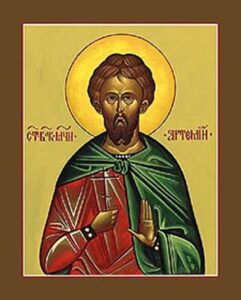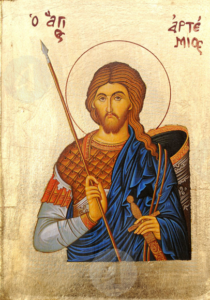St. Artemius of Antioch, Martyr – Oct 20

Holy and Great Martyr Artemius, who belonged to a noble family, was a veteran and prominent military leader of the army of Constantine, the Great, and his son and successor Constantius. Artemius received many awards for distinguished service and courage. In this official position he did much for the spreading and strengthening Christianity in Egypt.
Artemius was deputed by the emperor Constantius to bring the relics of the holy Apostle Andrew from Patras, and the relics of the holy Apostle Luke from Thebes of Boeotia, to Constantinople. The holy relics were placed in the Church of the Holy Apostles. The emperor rewarded him by making him Governor of Alexandria Egypt. He was made imperial prefect (dux Aegypti) viceroy of the Roman Egypt and later, was honoured with the rank of patrician. This rank indicated Artemius though a Christian was also had an elite status in the Roman Empire, thus a a notable participant in the highest affairs of emperor Constantius.
Arian bishop of Alexandria, George, the Cappadocian, had intruded upon the episcopal throne of Alexandria with the help of the Arian emperor, Constantius. St. Athanasius had fled, and it was the duty of Artemius to find him, which he endeavoured to do with great zeal among the monasteries and hermitages of the Egyptian desert.
The emperor Constantius was succeeded on the throne by Julian the Apostate. Julian in his desire to restore paganism was extremely antagonistic towards Christians, sending hundreds to their death. At Antioch, he ordered the torture of two pious bishops, Eugenius and Macarius unwilling to forsake the Christian Faith. It was during the reign of Julian the Apostate, Artemius was no less zealous against paganism, destroying temples and images. He publicly denounced Julian for his impiety. Many accusations against Artemius were made to the emperor, including that of breaking idols. He was accordingly deprived of his property and was presented before emperor Julian who censured him for his apostasy. The enraged Julian instantly had Artemius stripped of all official rank and subjected him to terrible merciless, tortures and threw the Great Martyr Artemius into prison.
In prison, while Artemius was praying, Christ, surrounded by angels, appeared to him and said, “Take courage, Artemius! I am with you and will preserve you from every hurt which is inflicted upon you, and I already have prepared your crown of glory. Since you have confessed Me before the people on earth, so shall I confess you before My Heavenly Father. Therefore, take courage and rejoice, you shall be with Me in My Kingdom.” Hearing this, Artemius rejoiced and offered up glory and thanksgiving to Him.

On the following day, Julian demanded that Artemius honor the pagan gods, which Artemius refused. The emperor resorted him to further tortures and the saint endured all without a single moan. However, the saint told Julian that he would be justly recompensed for his persecution of Christians. Julian became furious and resorted to even more savage tortures, but they did not break the will of the saint. Finally, the Great Martyr Artemius was beheaded. He endured many torments and was finally beheaded on October 20, AD 362/363.
His relics were buried by Christians. After the death of Saint Artemius, his prophecy about Julian the Apostate’s impending death came true. During the battle with the Persians, he was mortally wounded by an unseen hand and an unseen weapon. Julian groaned deeply said, “You have conquered, Galilean!” A pious noblewoman secretly recovered the Saint’s relics, after the death of the apostate emperor, the relics of the Great Martyr Artemius were transferred with honor from Antioch to Constantinople, where they were venerated and wrought many miracles for several centuries. The feast of St. Artemius is celebrated in some Oriental and Eastern Orthodox Churches on 20 October.

0 Comments